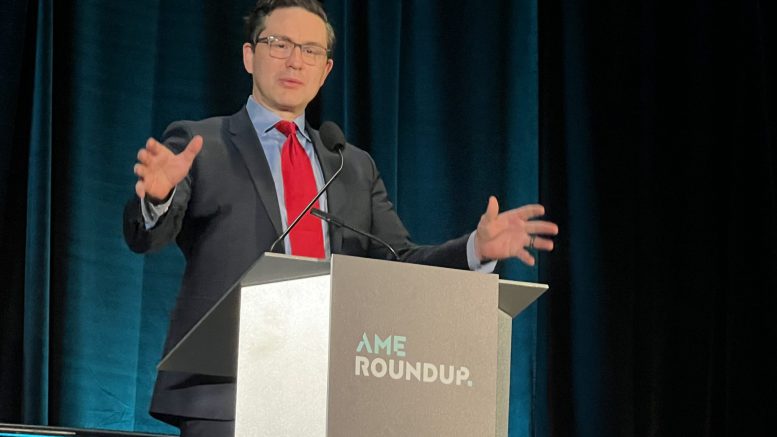The opening day of the Association of Mineral Exploration (AME) Roundup conference in Vancouver saw some political sparks fly as natural resources minister, Jonathan Wilkinson and Conservative Party firebrand Pierre Poilievre delivered remarks.
The opposition leader made the point that limelight-loving Liberal leader, Prime Minister Justin Trudeau, had squandered the past eight years to build an alternative supply chain able to service the emerging electric vehicle market and so-called energy revolution.
“Instead, miners today face permitting delays ranging from five to 25 years, according to official government information, higher taxes increased red tape and governmental obstacles that drive production down and pollution up,” Poilievre said. “That has been the effect of Trudeau-pian policy on mining and manufacturing.”
It means Canada imports batteries from countries like China, which burns coal in their production, which defeats the purpose of driving an electric car. He said the recent federal government announcements of new EV production capacity and battery precursor mineral processing plants opening were coming a little too late.
Canada ranks sixth in the world for lithium reserves, according to Poilievre. “And the last two years on record, we did not produce a tablespoon of lithium here in Canada, even while production has exploded worldwide,” said Poilievre.
“We have the third largest reserves of oil anywhere on earth, but we’re still importing 130,000 barrels of oil from overseas every single day, supporting foreign dictators and sending our money to them when we could be keeping it here,” he said.
Poilievre also pointed to Canada’s natural gas potential being undermined by stifling policy. “We have the sixth biggest natural gas resources globally; 1,300 trillion cubic feet of natural gas are right beneath our feet. We cannot export a single solitary cubic foot of that gas overseas because we do not have liquefaction facilities.”
Poilievre suggested the lack of liquefaction facilities was not to blame on the industry. “When Trudeau took office, 15 proposals for natural gas liquefaction were on his desk – zero have been built, not one. Meanwhile, the Americans have built six; the Qataris are selling more liquefied gas than ever. The Germans built an import facility for natural gas in 194 days, and Canada has been unable to build a single export facility in the past eight years.”
Poilievre continued his criticism of Canada’s mineral policy, saying the seeming inability to provide better-quality metal and energy products to energy-hungry Asian markets means more coal is being burned to power their electrical grids. It could be powered by clean Canadian natural gas, he said.
Capital flight
Poilievre stressed that money flows to where the biggest return is possible. “Why would you add the risk that you might wait around 25 years for a permitting ‘maybe’? Or a ‘no,’ when you can go to other countries where you can get an answer within 18 months? Well, the answer is you wouldn’t and that’s why increasingly, our money is leaving our country,” he said.
“Ten years ago, we had $22 billion of annual mining investment. Last year, we had $14 billion and that does not even account for inflation. Canadians invest $800 billion more in the rest of the world than the world invests in us because the money goes where it can get a return on investment.”
He lambasted Bill C-69 for having driven investment away by, for example, opening the door to identity politics when it comes to mine staff gender-based analysis. “So hard-working blue-collar men are the problem and that’s why companies need to make sure there are not too many men going to towns when mines open up.
“Can you imagine an investor looking at that criteria trying to figure out how to properly fill out the application to get it approved when you introduce that kind of woke nonsense and political discretion into the process,” Poilievre said.
Should Poilievre get an opportunity to form a government, he pledged to immediately repeal C-69 and replace it with a new law, “which consults First Nations, protects the environment, but gets things done in this country.”
“We have to stop stopping and start starting in this country as we have to speed things up.”
Poilievre proposed a three-point plan to get the industry moving again. It hinges on strong exploration tax incentives, removing the carbon tax and replacing it with more focused incentives and to double-down on nuclear generation to produce low-carbon impact metals.
Canada’s advantage
Speaking via a pre-recorded video, minister Wilkinson framed Canada as standing well-positioned to take advantage of the emerging economic opportunities the energy transition brings.
“A key element of our plan is identifying and seizing the opportunities that will be enabled as we move towards a lower carbon future,” said Wilkinson. “Successful strategies leverage comparative advantages and make no mistake, Canada has a lot going for it to help us win on a global scale.”
Canada has educated and highly trained people in place and significant deposits of natural resources that are increasingly in demand including critical minerals and hydrogen.
“Canada is a world leader in ESG standards and practices and how the global mining companies, a nation with abundant resources is eager to enhance our production of critical minerals and to build value chains in processing, refining and product manufacturing,” said the minister.
Late last year, the federal government launched Canada’s Critical Minerals Strategy, which outlines nearly $4 billion to support economic growth and competitiveness while promoting climate action and strong environmental management.





Be the first to comment on "‘Trudeau-pian’ policy drives mining investment away, says Poilievre"